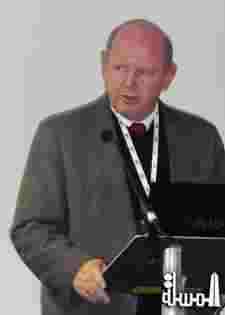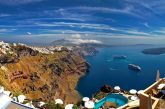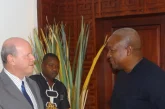
Cairo "Almasalla News "- The International Institute for Peace Through Tourism (IIPT) held a conference at the World Travel Market (WTM) 2011 ON meeting the challenges of climate change and the International Experts sitting on the panel presented leading models of best practice.
The IIPT Founder and President, Louis D’Amore was on hand to welcome everyone and act as moderator at the conference with the panel made up of Geoffrey Lipman the FTS, Director, greenearth.travel, Advisor to Secretary-General UNWTO, and President ICTP (International Council of Tourism Partners), Alain St. Ange the CEO, Seychelles Tourism Board, Dr. Murray Simpson, Co-Director and CEO, CARIBSAVE Partnership, and Oxford University Centre for the Environment and Max Haberstroh, International Tourism Consultant
The four members of the panel shared their knowledge, experience, and best practices in meeting the challenges of climate change to tourism. Both the Seychelles and Caribbean regions, heavily dependent on tourism and most vulnerable to the impacts of climate change including sea level rise, biodiversity loss, and impacts on human health presented real plans and actions already underway at the conference.Alain St.Ange, CEO of the Seychelles Tourism Board on his part said as he took to the podium to address the conference:-
“Seychelles and its policies to mitigate climate change is a reality. Seychelles remains the ideal country to address this topic because Seychelles is a country that depends on tourism, and Seychelles remains committed to consolidate its tourism industry for the future. The Government of Seychelles has recognised its responsibility and realises its obligations to be good custodians of the unique Seychelles, this treasure of the world for the world.
Seychelles is a small island developing state located in the Indian Ocean just below the equator, some 1600km from the east coast of Africa.
Our Archipelago consists of 115 islands, 42 granitic and the remainder coralline Most of the population of 87,000 live on the granitic islands of Mahé, Praslin and La Digue, along the narrow strip of coastal land. The total land mass of the islands stands at only 455km2, but the Exclusive Economic Zone (EEZ) covers just under 1.4 million square kilometers.
As such, Seychelles finds itself very much threatened by the phenomena associated with climate change. By virtue of what we are and where are located, the issues of sustainability and food and energy security have been forced to the forefront of national consciousness.
The challenges facing us are great: We only recently embarked on an ambitious policy of economic reform to rectify economic imbalances and today, we find ourselves in the frontline of the fight against another threat, that of piracy, which threatens the shipping lanes off the coast of Africa and which in turn threatens both our own security and our livelihood. Like many small island states we also suffer from lack of adequate funding for our climate-change related programmes, from a lack of technical capacity and from a dearth of human resources.
We are currently counted 4th in the world among those countries totally reliant on tourism and have, since many years, strong conservationist credentials in protecting our uniquely beautiful islands, their stunning natural beauty and their fragile ecosystems upon which the success of our tourism industry is based. Simply put, we cannot afford to fail.
Despite our several constraints, Seychelles is making headway and, under the National Strategy for Climate Change, introduced in 2009, stakeholders from Government, parastatals, NGO’s, people from the private sector and civil society are collaborating in mitigation efforts.
A Department of Risk and Disaster Management has been established which falls directly under the Vice-President of the Republic, in a move to coordinate efforts to improve Seychelles preparedness and response procedures to such phenomena as severe, tropical storms, Tsunamis rising sea levels, and periods of drought. Here, we are concentrating on strengthening evidence on risk factors and risk and tracking climate-related disaster losses and analysing their impact on development priorities. Investigation continues into cost-effective risk reduction options and improving early warning systems.
We are seeing a shift in the all-important issue of energy and energy policy with the establishment of an Energy Commission as the primary driver towards technology transfer in this area. We are also pursuing sustainable waste management together with improved waste recycling options that have been initiated by government and civil society and have embarked on the reorganisation of the parastatal company responsible for the management of energy and water which is currently looking at the potential for wind, biomass, micro-hydro, solar and other renewable energy resources. We are also studying the ways we might use transport, to further reduce our energy consumption. To this end, an upgrading of our public transport corporation is envisaged.
We are engaging more vigorously in local and international research programmes for biodiversity and marine resources while our tourism industry has, so far, proved resilient in the face of the recent storms of local and international economic crises due to the improved collaboration between the private sector and government and thanks to improved telecommunications which is set to make a quantum leap forward with the introduction of broadband into Seychelles in 2012.
In terms of Agriculture and food security, we are establishing an insurance scheme to cover livestock and crop farmers as well as an index of crop vulnerability to climate change. Livelihood portfolio diversification is at the top of our agenda along with bringing about changes to tillage practices, making better use of seasonal forecast information and increasing storage facilities. The agencies concerned are looking at better soil and water conservation as well as new crops suited to anticipated climatic conditions.
Where water resources and quality are concerned, we are investigating integrating rainwater harvesting systems in domestic, commercial buildings and schools and new ways of water rationing during periods of drought. Re-use of wastewater processes is coming under scrutiny as is the upgrading and increase of water distribution and storage systems. We are also aware that we must further refine our use of climatic forecasts available to us to be better prepared for any disaster.
Coastal erosion remains a major problem resulting in the loss of homes and agricultural land and as part of a mitigation process we are engaged in beach nourishment to protect the shoreline and creating flood corridors to dissipate storm waters. Early warning systems are being installed, with improved disaster response capabilities. Coastal defences are being strengthened in key locations using double-timber piling and rock armouring. At the same time, we are looking at reducing anthropogenic drivers of coastal erosion such as sand-mining, mangrove and wetland loss. Storm shelters are being constructed alongside the prohibiting of new development in high-risk areas and redirecting it to low-risk areas.
Mitigating climate change effectively also involves better natural resource management and here we are limiting the exploitation of existing resources. Livelihood diversification is being encouraged to reduce dependence on threatened natural resources as is a reduction in the drivers of eco-system loss and damage.
Our fisheries sector is seeing the establishment of a national sea-surface temperature monitoring network while our forestry sector is looking at the proper management and conservation of our forests. Sustainable harvesting of forest products is being encouraged as well as forest regeneration and erosion control. Important aspects of this process is the control of alien invasive species and protecting coastal vegetation from beach erosion. Our beaches, after all are our front line soldiers in this battle.
We have launched sustained environmental, education and awareness programmes through schools at the same time that the opening of the University of Seychelles in 2010, is assisting in redressing human resource constraints.
While these are worthy initiatives in themselves, we perceive that a segmented approach is not sufficient and so we continue to strive for the maximum cross-sectoral integration of these and future mitigating programmes.
To this end, we have recently launched our Tourism Sustainability Programme which is Seychelles’ first ever sustainable tourism certification system that will encourage hotels and other tourism establishments to merge the principles of sustainability into their daily operations.
Seychelles’ Sustainability Development Strategy is due to be rolled out which, together with the new Tourism Master Plan scheduled to appear at the end of this year, will provide us all with the opportunity to step back and view the bigger picture, affording opportunities for better dovetail our efforts across sectors and across a broader spectrum.
An unfortunate paradox in our fight against such challenges as global warming is the way that, particularly SIDS, become the victim of their own success, either by falling into the middle-income gap whereby they are perceived as no longer qualifying for whatever international funding is available, or by way of carbon taxes.
Whatever Seychelles has achieved it has done so at the expense of our meagre resources. One example of this is the way that we have set aside half of our limited landmass of 455 sq km as marine parks and natural reserves. Yes half of our total land area, our President, Mr James Michel has set aside for nature conservation and as a thank you we shall face the introduction of carbon tax that will make it more expensive for our visitors that we so depend on, yes make it more expensive for them to get to us. The sad irony is that carbon taxes further penalise us for having done a good job managing our environment and for the success of our programmes and the time has come to ask whether this is fair..or indeed sustainable…practice?
Ladies and gentlemen, in a nutshell, this is where Seychelles is in the fight to combat the effects of climate change. My allotted time does not permit me to go into further detail, only to paint in the broadest strokes and to reiterate our commitment to remain proactive and vigilant in facing the challenges associated with our world’s changing climate








